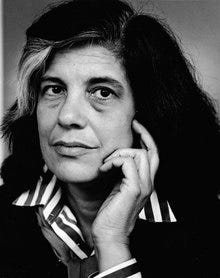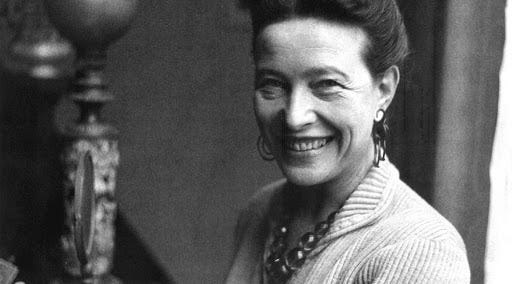I read with interest a review by writer Olivia Laing on the release of a new collection of Susan Sontag essays, On Women.
In Laing’s opening statement, she poses the question:
‘Did Susan Sontag like women? I’m not so sure she did, which made the arrival of feminism in the early 1970s a complicated prospect. Should she get on board or scuttle the ship?’
Laing is quick to point out however that she is not referring to Sontag’s personal life, in which she acknowledges the sexual relationships she enjoyed with women, albeit declining to publicly identify as a lesbian.
Liang’s issue is with this new collection of essays, in which she suggests that Sontag sometimes utilised her acknowledgement as being part of the second sex and sometimes disparaged such membership.
The new book contains essays from the 1970s; as she points out, a time when second wave feminism was hitting New York. These essays have not previously appeared in book form, rather forming part of what Laing refers to as Sontag’s ‘pronouncements from a jobbing writer’. The publisher’s jacket declares these essays as ‘fearless and incisive writing on women’, however Laing appears to dispute this, pointing to the decision to organise the book in chronological order of the published essays, revealing the thoughts and ideas of an uncertain Sontag.
Laing makes reference to such blunders as Sontag referencing women merely having the choice between two signifiers: that of Miss or Mrs, ignoring the fact that the recent publication of Ms magazine by Gloria Steinem had already introduced another option for women on this score. As she points out, this particular essay appeared during the same year as Ms, and that the new word was everywhere that year.
More perturbing for Laing is Sontag’s insistence on the way women age and the lies they tell about this, suggesting that women’s ‘weak’ and ‘servile’ nature keeps them childlike, appearing to suggest that by wearing makeup and living up to these stereotypes makes them culpable.
Her stance appears to have changed slightly however a year later, writing the essay ‘The Third World of Women’, in which she appears to suggest more radical suggestions for women’s liberation.
“The women’s movement must lead to a critical assault on the very nature of the state.”
But as Laing points out, many of Sontag’s suggestions to tackle such liberation were already underway by the women’s movement.
Further, she seems to have moved away from her brief solidarity with the movement by her 1975 essays, which reveal a Sontag defining herself separate and apart from her sisters in the movement.
“It is surely not treasonable to think that there are other goals than the depolarization of the two sexes, other wounds than sexual wounds”.
Laing claims that Sontag’s heart just didn’t appear to be in the struggle with sexual politics, rather attending to the issues of which she did feel a connection.
“What’s most noticeable about the last quarter of this book is that it starts to sound like Sontag. Her voice doesn’t quicken until it leaves the subject of women far behind.”
It is this sentence which brought me to think of another article I read a while ago about Simone de Beauvoir, and furthermore, about the way we perhaps put our expectations onto some writers and thinkers in a way that makes it impossible for them to ever live up to those expectations.
Writing what became known to many as the feminist bible, Beauvoir’s The Second Sex inspired many women to become feminists and seek independent lives similar to the author herself. However, since the author’s death in 1986, many letters and diaries have revealed her love affair with both another man apart from Sartre and her lesbian affairs with young women who were her students. This has led to speculation that Beauvoir hid some of the truth of her transgressions within her own autobiographical writings.
This has led to some speculation on whether Beauvoir was, in fact, as ‘feminist’ as her reputation leads us to believe.
Kate Kirkpatrick discusses some of these discrepancies within Beauvoir’s life and writings in her book Becoming Beauvoir: A Life. In it, she suggests that the answer to the question lies in what we consider to be feminist and which Beauvoir we are looking at.
I think this is an essential point when considering any text or writer’s intentions: we first must ask ourselves what we as readers are outlining as our own views or interpretations of a word, a movement, or an ideology.
Interestingly, Kirkpatrick raises the question: ‘are we the sum of all of our actions, or the sum of our worst?’ and suggests that Beauvoir lived alongside this question throughout her work.
Beauvoir was a leading figure within the strand of thought known as socialist feminism, which sought to highlight the problems inherent within patriarchy and capitalism.
As Kirkpatrick points out, evaluating the politics or behaviour of anyone, let alone such a prominently eminent 20th century writer and philosopher as Beauvoir, isn’t easy. Wide chasms of difference have opened up in the ideas of feminism in the intervening years – and even during the same periods. These can often contradict one another, as well as pit feminists against one another.
Kirkpatrick remarks that when Beauvoir was writing her fictional narratives featuring the lives of women, these were often already considered passé, with critics wondering where the male protagonists were.
As with many women writers and artists, the personal has proved more captivating to the public and much more interest, Kirkpatrick claims, has been placed on Beauvoir’s early adulthood and her relationship with Sartre. Much was made, for example, of their 1929 ‘pact’ to remain ‘essential’ to one another whilst allowing for an open relationship, forsaking no others.
Beauvoir’s philosophical writings indicate her wish for women to be free to choose for themselves the kinds of lives they lived and that there was no blueprint for the way our lives worked out, merely that we became who we were through our actions and choices. These were ideas she was developing in the 1920s, before her relationship with Sartre, and continued throughout the 1940s, often disagreeing with his own philosophical ideas.
Sadly, many of Beauvoir’s ideas were credited to Sartre, and many more were not translated outside of France.
Many of Beauvoir’s ideas within The Second Sex were formed around the difficulties faced by women that their existence was ‘justified’, and not merely justified by their relationships to others, and that the insistence on women fulfilling myths of femininity instead of encouraging their freedom and independence held them back.
Kirkpatrick points out that Beauvoir was criticised as being anti-women because of her denial of motherhood and marriage. But as she states, though Beauvoir felt that economic work helped women, she did not hold the idea that this was enough to make them free, nor was she against marriage or motherhood. Her ideas were instead intended to allow women to recognise their own value and have confidence in their own independence.
She wanted women to stop feeling like failures in line with the accepted myths of femininity and instead start making their own decisions.
Importantly, she wanted women to see, through her novels and portrayals of women, that they could fail and still not be a failure; that they could be infallible and human and still continue to dream and to live as they chose.
Even more importantly, as Kirkpatrick so succinctly points out, Beauvoir did not set out to write the feminist bible. Beauvoir’s own autobiographies may be accused of leaving out her own failures to live up to her own expectations. But she was well aware of the omissions and the distortions this may make to the subject of her life.
I think this is an interesting point to end on. It can be difficult to accept the human infallibility of our icons. As a feminist icon, we expect someone who wrote the ‘feminist bible’ on sexual politics to live up to an ideal; just as Laing found something lacking in Sontag’s writings on women.
But isn’t it also true that the whole point of a feminist ideology is that all genders have the same choice and opportunity? Surely then, this should extend to women writers having the right to choose what they share both about themselves within their personal writing, and the subjects they choose to write about - as well as their right to fail at either.
The topics which interest them enough to explore and write at length about do not have to be about women or the women’s movement, simply by default of them sharing the same gender. Equally, they are not forced to like or agree with every tenet of the feminist (or any other) movement. Because they are women, they do not ‘owe’ us the need to write singly about women’s issues, if there are other issues which more deeply obsess them. This is a point on which Laing’s review of Sontag’s collection goes on to reflect:
“Of course, she had a right to choose her subjects. Of course, not every argument need spool back to the dominance of men over women”.






So much food for thought. I feel as though we are rapidly losing not only the context for older texts but also an awareness that we need to seek out that context to understand them. The way de Beauvoir has been translated adds to this problem.
I really like that you noted their right to fail at something. It takes a step back from whether or not they did fail, and asserts instead their imperfect humanness.